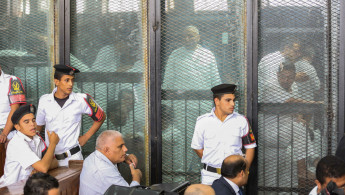Cairo court delays verdict in mass trial over Rabaa protest
The final ruling in a case against more than 700 people involved in a 2013 sit-in protest that turned deadly in Egypt has been delayed by an Egyptian court.
The delay into the ruling was due to “security concerns” surrounding the transfer of defendants to the court, a court statement said on Saturday.
The case involves former senior officials, including leader of the banned Muslim Brotherhood group Mohamed Badie and the son of former President Mohammed Moris, as well as the UNESCO press freedom prize winner Mohmoud Abu Zeid - more commonly known as Shawkan - who faces the death penalty.
Amnesty International condemned the trial.
"The idea that more than 700 people could all stand trial together in one day, all facing the death penalty in what is clearly a grossly unfair trial that violates Egypt's own constitution beggars belief," said Amnesty International's North African campaigns director Najia Bounaim.
The massacre of over 1,000 people by Egyptian security forces at Cairo's Rabaa Square in 2013 marked a dark defining point for human rights in Egypt, and the start of a vacuum in justice leading to unchecked state violence ever since.
Not a single person has been held accountable for the mass killing of the hundreds of demonstrators who attended sit-in protests against the 3 July military coup of Mohamed Morsi.
Instead, President Abdel Fattah al-Sisi's regime has led a bitter campaign against political dissidents, detaining thousands and sentencing hundreds to death in mass trials.
Journalists, photographers, human rights activists, and Muslim Brotherhood supporters have been systematically purged in a bid to suppress the legacy of Rabaa, and maintain power.
Cairo has maintained it allowed protesters enough time to peacefully leave before cracking down on the demonstrations and has blamed Muslim Brotherhood members of triggering the violence.
Egyptian authorities under President Abdel Fattah al-Sisi have arrested tens of thousands of activists as part of an ongoing campaign to suppress political dissent in the country.
Hundreds have been killed since Sisi took power in a 2013 military coup, and over 40,000 people are believed to have been jailed.





 Follow the Middle East's top stories in English at The New Arab on Google News
Follow the Middle East's top stories in English at The New Arab on Google News


